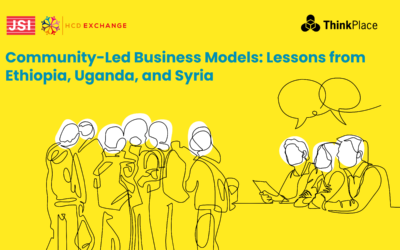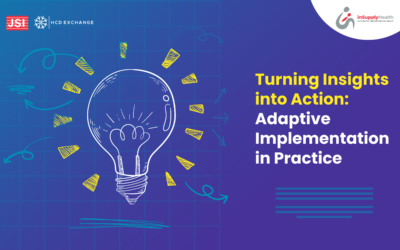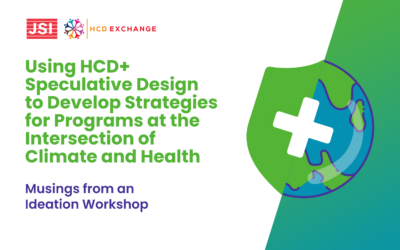On October 7, 2020, we held our first ever monthly community call with 44 members of the HCDExchange community. The goal of the call was to create space to align on the mutual vision for the community, collectively agree on the core principles and community participation guidelines for engaging with each other, and identify opportunities to support one another’s work.
Through a vibrant collaborative writing exercise and facilitated discussion, community members gave input into their aspirations for how they would like to see the HCDExchange community of practice support the HCD+ASRH ecosystem.
Our ideal community
We asked participants to think about the kind of community they would like to participate in and identify the values and principles for engagement that would characterise such a community.
Participants were overall aligned with our community participation guidelines and wanted to build a diverse, inclusive and open community that would accommodate many different viewpoints. Participants also wanted to get value out of being part of the community—whether through activating collaborations, benefiting from learning assets and events, or receiving mentoring.
Issues of focus
Our discussion raised the following themes around community building:
Diversity and inclusion
Participants made clear that our community needed to be an environment free from judgement and discrimination, and one that could be relied on to create a safe and affirming space for people from different identities and backgrounds to discuss ASRH+HCD topics. In line with this, we heard from many participants that they would like us to broaden our engagement to languages beyond English, particularly French, and provide sign language captioning in our multimedia content.
Participants also requested our events to consider varying learning styles, such as through limiting presentations and focusing more on facilitated discussion.
Centering young people
Participants hoped the community could model what it means to be youth-centred by ensuring that youth can have a central role in shaping the community of practices’ agenda and issue areas. (Learn more about our youth engagement through the HCDExchange Youth Leadership Hub)
Reflectiveness, honest conversations, and continuous learning
Participants emphasised a desire for HCDExchange to provide a platform for more honest conversations on critically evaluating the successes and challenges of HCD+ ASRH programming. Participants hoped to engage in continuous reflection on what works and doesn’t work for young people, and were particularly interested in hearing this kind of feedback directly from young people.
Localisation, focusing on Global South contexts, and connecting HCD frameworks to lived realities
Participants desired for the HCDExchange to help share learning and knowledge assets on HCD+ASRH rooted in Global South contexts and realities. Participants wanted more resources on understanding how HCD frameworks can be adapted to work well in their regions in ways that take into account the resource and stakeholder profile in developing countries. Participants were also interested in seeing more visibility and representation of the lived realities of adolescents at the grassroots, especially across class and geographical boundaries.
Practical, value-adding community activities
Participants expressed desire to participate in tangible activities to reflect and work on HCD+ASRH challenges. Participants were enthusiastic about participating in working groups, design sprints, hackathons and research opportunities on specific topics within ASRH+HCD for deeper and sustained engagement.
Connecting with each other deepening engagement in HCD+ASRH
We also heard a lot about how we can support your individual endeavours through linking you with others in the community for collaboration opportunities. For those who submitted requests for support, we’ll be reaching out to you in the coming weeks with introductions and/or connections to resources relevant to your work. If you’d like to be connected with other members of the community, let us know your specific needs via community@hcdexchange.org and we’ll get back to you.
Next steps
In the coming weeks, we will be embarking on several actions in response to the community’s input on the call:
- diversifying our languages on social media and in some of our learning assets to include French,
- facilitating connections to community members or resources based on your requests for peer support,
- convening further monthly community calls to get more detailed feedback on our strategy,
- sharing more information about our upcoming working groups and ways you can get involved. (keep your ears on the ground for more information on this!)
We want to thank all our awesome community members who contributed to making our first community call spirited, engaging and valuable. Look out for an invitation to the next community call in your email!
Missed the community call? Watch it here or read the notes. If you have any more questions, don’t hesitate to reach out to us via community@hcdexchange.org.



